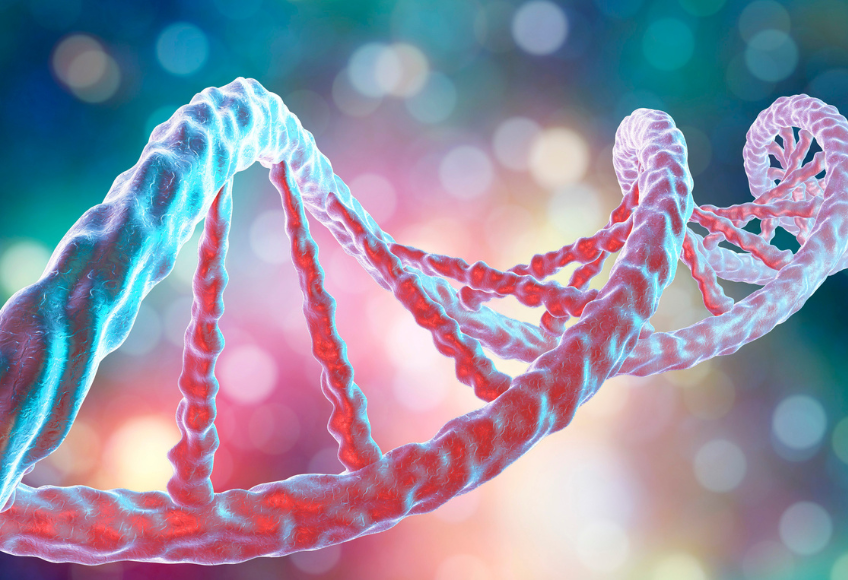
Influence of genetics on histamine intolerance
Did you already know that your genes have a big one
Role playing how your body metamin meters?
And this not only means a genetically related histamine intolerance, but in general your genetic predisposition in terms of histamine intolerance.
Your genes determine, among other things:
- Whether and how strongly you react to histamine liberators.
- Which symptoms of histamine intolerance primarily occur with you.
- How well or bad your histamine mining works.
As you certainly know, histamine intolerance is a disturbance in which the body cannot properly dismantle histamine. Histamine is one chemical connectionthat occurs on the one hand in the body and on the other hand can be found in many foods. It is known for his Role in allergic reactions and inflammation.
The influence of genetics on histamine intolerance is complex and is currently being researched intensively. But there are already indications that genetic factors play a role in susceptibility/disposition for histamine intolerance can. Some genetic variations can lead to certain enzymes that are responsible for the breakdown of histamine in the body. One of these enzymes is the Diaminoxidase (DAO). It sits in the small intestine and is the key enzyme in histamine breakdown. Mutations or variations in genes that are responsible for the production or activity of DAO, can negatively affect the efficiency of this enzyme. So if the DAO does not work properly, histamine cannot be sufficiently broken down. This leads to an increase in histamine levels in the body and triggers the typical symptoms of histamine intolerance.
How can the genetics symptoms of histamine intolerance influence?
Genetic factors can affect histamine intolerance or also trigger an assessment by influencing different areas of histamine metabolism and histamine regulation in the body. We will show you some options here:
Enzyme activity: Genes play a role in the production of enzymes that are involved in the histamine metabolism. Variations or mutations in these genes can lead to reduced enzyme activity, which affects histamine breakdown and increases the risk of histamine intolerance.
Regulation of enzymes: Genes can also influence the regulation of histamine -reducing enzymes. Variations in genes such as HNMT or HDC can influence the activity and expression of these enzymes, which in turn affects the production and breakdown of histamine.
Genetic interactions: Histamine intolerance is probably influenced by the interaction of several genes and not by a single gene alone. Various genetic variations can interact with each other or with other factors and thus control the overall risk and the severity of a histamine intolerance.
Histamine receptors: Genes that are responsible for histamine receptors can influence sensitivity and reaction to histamine. Histamine receptors are proteins that sit on the surface of cells and recognize histamine and react to them. There are four main types of histamine receptors (H1, H2, H3 and H4 receptor). Each of these recipe types has specific functions and can be found in different tissues and organs of your body.
Genetic variations can influence the expression, structure or function of these histamine receptors, which in turn can affect the reaction of the body to histamine. Some of these variations can lead to the receptors react more sensitive or less sensitive to histamine; So do the mast cells no, little or much histamine. This could also be a reason why those affected react individually to histamine liberators.
An example of a genetic variation that influences the histamine receptor is a so-called polymorphism called RS1800544 in H1 recipe (HRH1). This variation has been associated with increased sensitivity to histamine and could lead to increased allergic reactions or symptoms of histamine intolerance.
Similarly, a variation in the H2 recipe (HRH2) can influence the reaction of the body to histamine. The H2 receptor is mainly available in the gastric mucosa and plays a role in regulating gastric acid production. Variations in this gene can help to ensure that certain people are more susceptible to stomach problems such as heartburn or stomach ulcers. Especially when histamine plays a role, such as when absorbing histamine -rich foods.
It is important to emphasize that the effects of these genetic variations on the histamine receptors can vary from person to person and also depend on other influences such as environmental factors and individual health. Research in this area is still in progress and there is still a lot about the exact role of genetics in regulating histamine receptors and their effects on health.
6 general genes that influence histamine intolerance
The six most common genes associated with histamine intolerance include:
1. Diaminoxidase (dao)
The DAO gene plays a crucial role in the production of the enzyme dao, which reduces histamine in the digestive tract. The DAO mainly metabolizes histamine from food to prevent its accumulation in the intestine and the occurrence of symptoms. Variations or mutations in the DAO gene can affect the production or activity of the DAO enzyme, which leads to a disturbed histamine mining. This enriches histamine in the body and symptoms of histamine intolerance can arise.
Typical symptoms, especially after eating histamine -rich foods:
- Headache
- migraine
- Digestion problems, nausea
- Skin problems
- Flush
- Allergy -like reactions
2. Histamine N-methyltransferase (Hnmt)
The HNMT gene is responsible for the enzyme. This enzyme mainly reduces the body's own histamine. Variations or mutations in the HNMT gene can affect the activity or expression of the HNMT enzyme and impair the efficiency of the histamine metabolism. This leads to a reduced histamine mining and increased histamine values in the body.
Typical symptoms:
- Headache
- clogged nose
- Rashes, atopic dermatitis
- asthma
- Gastrointestinal problems
- Unrest, sleep disorders, fatigue
- Dizziness, anxiety
- Allergy -like reactions
3. Histidin decarboxylase (HDC)
The HDC gene plays a crucial role in the production of histamine in the body. The HDC gene provides instructions for the production of the enzyme histidind carboxylase, which converts the amino acid histidine into histamine. Variations or mutations in the HDC gene can affect the activity or expression of the enzyme Histidind carboxylase, which leads to changes in histamine production. This can lead to an unbalanced histamine level that contributes to the symptoms of histamine intolerance.
If the HDC gene is affected, it can increase or reduce histamine production depending on the specific variation. A higher histamine synthesis can lead to an excess of histamine in the body, which results in increased sensitivity to symptoms. On the other hand, lower histamine synthesis can affect the body's ability to maintain an optimal histamine level, which can also lead to histamine intolerance symptoms.
4. Methylentetetrahydrofolate reductase (MTHFR)
The MTHFR gene is not directly related to histamine intolerance. However, it plays a crucial role in a biochemical process known as methylation. The MTHFR gene provides instructions for the production of the MTHFR enzyme, the folate (vitamin B9) converts into its active form (methyl folacy). Methyl folk is an important part of the methylation process, which influences different body functions, including the metabolism and the excretion of histamine.
Impairments of the MTHFR gene can lead to reduced production or activity of the MTHFR enzyme and thus to a reduced methylation capacity. This can affect the regulation of histamine levels and contribute to symptoms. In addition, people with MTHFR genes tend to become imbalances in other methylation-related processes that can further influence histamine metabolism and histamine intolerance.
5. HRH1
You have already got to know the HRH1 gene above. This gene plays a role in determining sensitivity and reactions to histamine by controling the H1 receptor. Changed variants of the HRH1 gene can lead to an increased sensitivity or overactivation of the H1 receptor, which causes exaggerated reactions to histamine.
Typical symptoms:
- Rashes
- itching
- stuffy nose
- Breathing difficulties
6. Monoaminoxidase (MAO)
The main task of the enzyme Mao is to reduce biogenic amine such as tyramine and catecholamines. However, it can also affect the histamine level in the body. A low MAO mirror can lead to a reduced breakdown of histamine, which results in high histamine concentrations in the body. This imbalance can contribute to the development or worsening of histamine intolerance symptoms. In addition, variations in the gene can also lead to fluctuations in the mirror of other biogenic amines. If biogenic amines increase next to histamine, strong symptoms could arise. In addition, biogenic amine is always broken down by the enzyme dao, so that histamine can often no longer be adequately metabolized.
Of course, genetics are not everything. It is only part of the picture. Environmental factors, nutrition, lifestyle, external influences and other diseases also play an important role in the development of histamine intolerance.
Nevertheless, it is now scientific consensus that our genetics have a great influence on our health and the development of diseases depending on the assessment. This opens up new opportunities to estimate and counteract any preventive risks for certain diseases. Especially when several family members suffer or suffered from the same diseases, genetic clarification can be useful.
Advertising
And because not only our genes, but also the right foods play a major role in terms of your hit, you can now shop the right products here!
Genetically related histamine intolerance?
With a genetically related histamine intolerance, there is a defect in genetics, which means that histamine intolerance arises. In general, it is said that only a very small part suffers from an actually genetically conditioned histamine intolerance, although there are no official figures here and the number of unreported cases can be higher. If there is a genetic defect, then a low -histamine diet is the be -all and end -all. Nevertheless, there are already approaches in which epigenetics can be intervened in genetics. The further research on this remains very exciting.
👉🏼 How can I have it tested whether I suffer from a genetic histamine intolerance?
- Gen doctors, naturopaths or geneticists: A gene doctor, naturopath or geneticist can help you select the right test and interpret the results. You can also help you exclude other potential causes of your symptoms and carry out a comprehensive anamnesis.
- Online services, online laboratories: There are various online laboratories that offer genetic tests for various health states. It is important to research beforehand that this service is really serious. Expert laboratory: https://www.imd-berlin.de/fachinformations/diagnostikinformations/histamin-in-
Collapsible content
Sources
- https://drbeckycampbell.com/exploring-the-role-of-genetics-in-histamine-intolerance/
- 3269 - gene result of Histamine Receptor H1 [(human)] - NCBI. March 29, 2023, https://www.ncbi.nlm.nih.gov/gene/3269.
- Molecular Regulation of Histamine Synthesis - PMC - NCBI. ” 20 Jun. 2018, https://www.ncbi.nlm.nih.gov/pmc/articles/pmc6019440/.
- Polymorphisms of Two Histamine-Metabolizing Enzyme Genes. 1 Nov. 2010, https://www.ncbi.nlm.nih.gov/pmc/articles/pmc2990726/.
- Variability in Histamine Receptor Genes HRH1, HRH2 and HRH4 in…. ” https://pubmed.ncbi.nlm.nih.gov/24236486/.
- Mutations in the histamine n-methyltransferase gene. https://academic.oup.com/hmg/article/24/20/5697/556613
- Histamine and Histidine Decarboxylase: Immunomodulatory ... - NCBI. May 12, 2020, https://www.ncbi.nlm.nih.gov/pmc/articles/pmc7497259/. Methyleneetetrahydrofolate Reductase (MTHFR) C677T Polymorphism. ” https://pubmed.ncbi.nlm.nih.gov/25449138/.
- Molecular Biology of Methyleneetetrahydrofolate Reductase (MTHFR) https://www.ncbi.nlm.nih.gov/Books/nbk6561/.
- Why Monoamine Oxidase B Preferably Metabolises N ... - NCBI. 8 Feb. 2022, https://www.ncbi.nlm.nih.gov/pmc/articles/pmc8836602/.
- https://www.hofweissbad.ch/wie-unsere-gene-die-gesundheit-beeinflussen/#:~:text=Bestimmte%20Genvarianten%20oder%20%2Ddefekte%20k%C3%B6nnen,mehr%20oder%20weniger%20Nebenwirkungen%20hervorrufen.

From those affected for those affected
We are Thomas and Michaela Zinser, founder of Histaminikus.
Because of the own histamine intolerance of Michaela and our son, we founded Histaminikus. The frustration does not find any suitable histamine food has spurred us to develop low -histamine food.
We would like to give you back a piece of quality of life. Feel free to look around with us.
Kind regards
Thomas and Michaela







